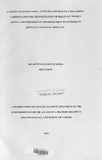| dc.description.abstract | Background
Kenyatta National Hospital is the largest of the two main level 6 ( National Referral Hospital) health facilities in Kenya. It has one labour ward, with a bed capacity of twenty six. Though it is supposed to handle referrals mainly from public and sometimes private hospitals, it handles more walk in patients than referrals. Most of the times the hospital is not forewarned of the referrals so as to get prepared. Some of these mothers may require CPR (Cardiopulmonary Resuscitation) at some point during their management. Resuscitation of these mothers is done by a team consisting of obstetrics and gynaecology registrars (postgraduate students undertaking their masters degree) nurses and sometimes the anesthesiology registrars.
Objective
The objective of the study was to assess knowledge, attitude and practice of CPR of pregnant women among anesthesiology and obstetrics registrars.
Methods
It was a cross-sectional descriptive study was to assess knowledge, attitude and practice of CPR of pregnant women among anesthesiology and obstetrics gynaecology registrars. The target population was all anesthesiology registrars (n=26) and all Obstetrics Gynaecology (n=59). A pretested questionnaire was used to collect data which was then be analyzed using Statistical Package for Social scientists (version 11.0; SPSS, Chicago, IL)
Results
78 (97.5%) felt training on resuscitation of pregnant woman was important. More than 51.2% of the registrars felt they were more than 50% knowledgeable. It was observed that resuscitation of pregnant women in KNH was done by obstetrics registrars covering the floor with the help of nurses and sometimes requested for resistance from the anesthesiology registrar on call. Majority of the anesthesiology registrars 20 (80%) felt that the team leader should be the Obstetrics registrar while majority of the Obstetrics registrars 51 (93%) felt that the anesthesiology registrar should be the team leader. 13 (15%) of the registrars felt that resuscitation was not necessary in some conditions. Majority (6) felt that resuscitation was not necessary in cases of prolonged cardiac arrest. Lack of equipment 62 (77.5%), lack of knowledge 52 (65%) and lack of team work 45 (55%), were graded as the major factors affecting CPR respectively.
Anesthesiology registrars felt supine position was inappropriate for a pregnant woman and should instead be placed in the left lateral position to avoid aortocaval compression by the gravid uterus. More than half of the obstetrics registrars (58.2%) practice was in keeping with what the first responder should do according to the 2010 Algorithm on maternal cardiac arrest CPR. Anesthesiology registrars consider defibrillation to be an important part of resuscitation compared to the obstetrics registrars. 3 (5.5%) of obstetrics registrars would not defibrillate due to concerns about effect of the shock on the foetus. Despite the willingness to perform defibrillation on pregnant women by the registrars, very few of them actually adhere to the modified CPR protocol of removal of foetal monitors before defibrillation. 2 (3.6%) of the obstetrics registrars had ever performed a perimortem cis (Procedure of cesarean delivery concurrent with maternal C.P.R). 99% of the anesthesiology registrars were conversant with anatomical changes in the airway compared to obstetrics registrars 89.1%.
Conclusion:
Obstetrics and anaesthesiology registrars are more likely to encounter cardiac arrest in pregnancy. Although the incidence of this is small, this is not a reason for these cadres of doctors not to have knowledge on resuscitation of parturients and not to have the right attitude. Therefore these doctors should receive regular trainings on resuscitation focusing on parturients. | en_US |

